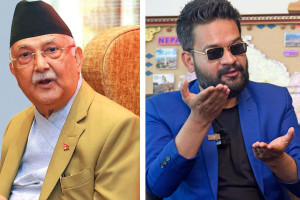Thu, Feb 12, 2026
Columns
Ecology, literature and English
In Nepal, engaging in creative works in English has led to organising seminars on literature and ecology.
bookmark
Abhi Subedi
Published at : August 2, 2025
Updated at : August 3, 2025 07:23
Is literature a fugitive subject within ecology, English language and literature? The papers presented at a recent interdisciplinary seminar titled ‘Literature, ecology and conservation’ stressed that the reality was different. Literature works as a catalyst, not a fugitive subject.
I was delighted when the literary scholars from the English departments presented brilliantly critical and thought-provoking papers on ecology and literature. It included a keynote speech on this theme, a study of ecology in the representative works of poets like Balakrishna Sama, Laxmi Prasad Devkota and others, poetry and ecology as a subject in its own right, and a study of nature in the traditions of Indic philosophy, mainly the Upanishads and the Vedas. Some scholars presented cogently written papers on ecology from comparative perspectives. I liked the major thrust of the seminar and that of the paper writers. Everything was shaped by the quest for the right idioms to express a holistic perspective on the theme of literature and nature. Some poets presented this consciousness in poems written in Nepali and English.
A brief background story is in order.
A letter of invitation sent to me by Keshav Raj Chalise, President of Village of English Writers (VIEW), Chitwan, was an admixture of delight and surprise. I was invited to attend its fourth national conference in Sauraha on July 26, 2025. I could gather that VIEW is an organisation of English teachers who teach at the tertiary level of education in that area. Most of the activists of this organisation turned out to be my erstwhile students at different times at the Tribhuvan University Central Department of English in Kirtipur, including, to my surprise, the champion of English education and ‘patron’ of literary organisations of the Chitwan area, LB Kshetri.
Similarly, meeting Professor Sharada Thapaliya, Vice Chancellor of Agriculture and Forestry University, as the chief guest of the occasion, was another memorable coincidence. She is the first woman vice chancellor of any significant academic organisation I have met under a system entrenched in male hegemony in over half a century of my career in tertiary education in Nepal. This short piece expresses my surprise, admiration and questions evoked by this occasion.
I want to begin with an important reference to the history of the radical changes we made in the English curriculum at the graduate level in English at the end of the twentieth century at the Central Department of English (CDE). And that was used in all the graduate-level classes of English literature. The syllabus, as stipulated in the founding statute of Tribhuvan University at the beginning, was named English literature, following the pattern of the Indian and British universities. That is still a pattern of the curriculum in the syllabi of the universities.
What we did at the CDE was change the nomenclature, if not the statute, and open the English literature department to other related areas of studies in the humanities, like arts, culture, gender and theories known commonly here as literary theory. We created a model by drawing mainly from the cultural studies as popularised by Raymond Williams and Stuart Hall. We included topics related to literature, like comparative studies of literary traditions and the relationship between indigenous themes and the canons of literary studies. It became a broad-based syllabus. It was a great experience to work as head of the department with the cooperation and ideas of some learned colleagues.
Shreedhar Lohani played an important role in that moment of academic challenge. The syllabus evinced an interdisciplinary spirit by keeping literature at its core. Our next challenge was to find teachers to teach this course. We solved that by assigning the responsibility to young, talented teachers who played a great role. They have now retired but are actively engaged in academic work. They had a great impact on the English literature syllabus. The courses displayed the relationship between history and literature principally as propounded by Hayden White, to name one. It is not possible to mention all the names here. But the syllabus became flexible and inclusive. We changed the title of the syllabus from English literature to ‘literature written in English’, broadening the scope of the studies of literature written in English in this region and Africa.
There was another impact of the transformation of the syllabi. Students and researchers used the Nepali texts of literature, history and culture to write PhD dissertations and earn a degree. Some scholars who worked here and those who worked in universities in America, Canada, Britain and India wrote PhD dissertations on themes that included Nepal’s literary and cultural texts. The process continues.
In Nepal, engaging in creative works in English has propelled various activities like writing poetry and novels in English and organising seminars where topics such as literature and ecology are discussed. The confidence evinced by such nomenclature as ‘Village of English Writers, Chitwan’ is significant in several ways. It shows that those who do so create a separate identity as English writers and claim a village of their own. Some organisations and societies are devoted to promoting creative writing in English in Nepal. This encourages writing in English, but producing creative works in English and sending them out to a broader audience is challenging in many ways. The most important one is the quality and acceptability of the work itself.
But I find the Chitwan experiment an important proposal towards promoting creative education with English as a writing medium. The question remains. We may ask, as the creators of such organisations, are the English teachers using this karma for teaching English in the English classroom? If so, what is their experience? Are they putting their ideas at the colloquiums of the nationwide Nepali English Language Teachers Association (NELTA)?
The CDE and some other departments of different campuses have been organising seminars and interactions on topics that evoke interdisciplinary studies. But I found the message of VIEW, Chitwan, very eloquent. Some very good papers on ecology and problems facing Nepal and the world were presented at the conference alongside those that evoked the India: classical perceptions of nature, as could be seen, in the Upanishads alluded to by some good presenters. This seminar of “English writers” in the village of Chitwan has introduced themes and challenges that need to be addressed prudently, productively and openly.
Most Read from Columns
Editor's Picks
E-PAPER | February 12, 2026
×




 13.12°C Kathmandu
13.12°C Kathmandu















